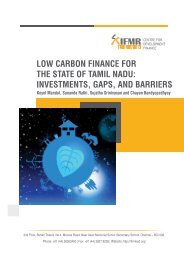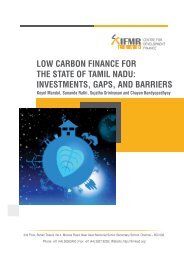Enhancing India’s Readiness to Climate Finance
India has taken several steps to improve its national response to climate change. India’s climate finance requirements, however, are very high, and will need to be met through a combination of public, private and international climate finance. See more at: http://shaktifoundation.in/
India has taken several steps to improve its national response to climate change. India’s climate finance requirements, however, are very high, and will need to be met through a combination of public, private and international climate finance. See more at: http://shaktifoundation.in/
- No tags were found...
You also want an ePaper? Increase the reach of your titles
YUMPU automatically turns print PDFs into web optimized ePapers that Google loves.
<strong>Enhancing</strong> <strong>India’s</strong> readiness <strong>to</strong> access and deliver international climate finance<br />
mandates on climate finance with clearly defined roles and responsibilities have not been clearly<br />
elaborated.<br />
Lessons & Options for India<br />
<br />
India can learn from the experiences in Indonesia, where legal mandates <strong>to</strong> implement<br />
national climate change plans have led <strong>to</strong> greater accountability in planning, financing, and<br />
implementation structures.<br />
In most countries climate finance mandates have not been clearly defined or implemented. However<br />
Indonesia has adopted legal mandates <strong>to</strong> take action on climate change, backed by a climate finance<br />
institution that has a clear mandate <strong>to</strong> coordinate the financing of climate interventions.<br />
Indonesia’s National Council on <strong>Climate</strong> Change is legally mandated <strong>to</strong> formulate strategies,<br />
programmes and activities on climate change; play a coordinating function in the implementation<br />
of climate change activities; set up policies and procedures for carbon trading; and carry out<br />
moni<strong>to</strong>ring and evaluation of climate change policy implementation. In parallel with the NCCC, the<br />
Indonesian <strong>Climate</strong> Change Trust Fund (ICCTF) was established by Ministerial Decree in 2011<br />
<strong>to</strong> align international financial resources and domestic budgets with Indonesia’s climate<br />
change and development priorities. 41 The ICCTF’s decisions are made by a steering committee<br />
that includes the Government of Indonesia, development partners and civil society organisations –<br />
with representatives of international agencies, local government, and intergovernmental agencies<br />
acting as observers. The National Development Planning Agency (BAPPENAS) administrates the<br />
ICCTF, and is responsible for formulating procedures and planning for climate finance, coordinating<br />
climate change loans and grants, and for mainstreaming climate change in<strong>to</strong> national policies. The<br />
ICCTF is only at the early stages of operationalisation and cannot yet provide firm lessons on climate<br />
finance coordination at the national level. However once it begins <strong>to</strong> fund concrete adaptation and<br />
mitigation projects, the ICCTF will be able <strong>to</strong> provide early lessons on national coordination of climate<br />
change plans that are joined with robust financing strategies.<br />
<strong>Readiness</strong> Gap 2<br />
There have been limited efforts <strong>to</strong> assess the impact of climate change on the national economy,<br />
and <strong>to</strong> prioritise climate-related investment within national and/or sec<strong>to</strong>ral budgets, based on a<br />
detailed needs assessment.<br />
Based on analysis done by the Expert Group on Low Carbon Strategies, it is clear that present levels<br />
of funding for climate activities in India are insufficient <strong>to</strong> meet the goals of the NAPCC. In the shortterm,<br />
as the GoI elaborates a longer-term climate finance strategy, a detailed needs assessment<br />
could help <strong>to</strong> prioritise the most important climate change actions and interventions. A detailed needs<br />
assessment could also help <strong>to</strong> identify current gaps in climate funding, and <strong>to</strong> initiate a strategy <strong>to</strong><br />
access further climate finance from a variety of different sources in-line with <strong>India’s</strong> most urgent<br />
priorities. A cost-benefit analysis of needs would also help <strong>to</strong> mainstream climate in development and<br />
sec<strong>to</strong>ral strategies and ensure buy-in from line ministries on tacking cross-cutting issues.<br />
Lessons & Options for India<br />
<br />
Brazil and Indonesia have undertaken cost-benefit of climate actions and/or detailed needs<br />
assessments, which has helped <strong>to</strong> prioritise policy actions and investment <strong>to</strong> meet funding<br />
gaps.<br />
Brazil has committed <strong>to</strong> reducing its national emissions by 36.1-38.9% against BAU by 2020. A<br />
Federal Decree has mandated that mitigation plans for Brazil’s main sec<strong>to</strong>rs are included in<br />
the national action plan on climate change. Each of these plans include emission reduction<br />
41 ICCTF Regula<strong>to</strong>ry framework is supported by a number of Presidential Decrees, Laws and specific<br />
Ministry regulations. http://www.icctf.or.id/about/regula<strong>to</strong>ry-framework/<br />
Ref: Ricardo-AEA/R/ED59216/Final Report<br />
39

















